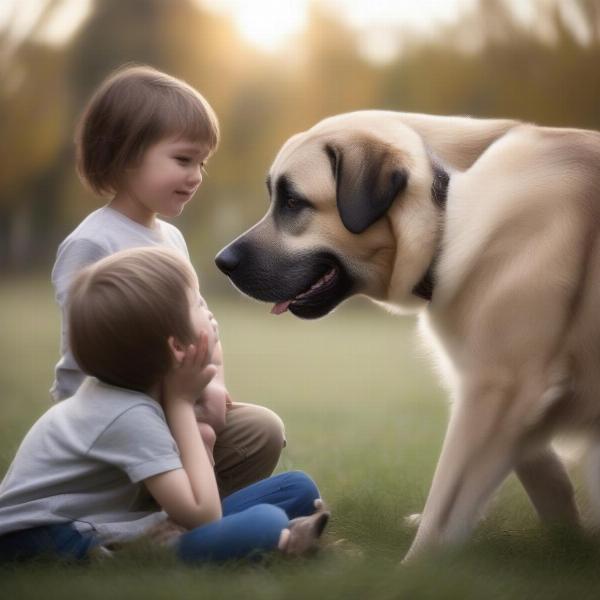Anatolian Shepherd Livestock Guardian dogs are renowned for their imposing size, unwavering loyalty, and remarkable ability to protect livestock. These powerful dogs, originating from Turkey, have a rich history as guardians and possess unique characteristics that make them both fascinating and challenging companions. This comprehensive guide delves into everything you need to know about Anatolian Shepherds, from their temperament and training needs to their health and care requirements.
Understanding the Anatolian Shepherd’s Temperament
Anatolian Shepherds are inherently independent and protective. Bred to guard livestock against predators, they possess a strong sense of territory and a natural instinct to defend. While generally calm and composed, they can be wary of strangers and react defensively if they perceive a threat. Early socialization is crucial to ensure they develop into well-adjusted adults. This involves exposing them to various people, animals, and environments from a young age.
Training an Anatolian Shepherd: Patience and Consistency are Key
Training an Anatolian Shepherd requires patience, consistency, and a firm but gentle approach. Their independent nature can make them somewhat resistant to traditional obedience training methods. Positive reinforcement techniques, such as rewarding desired behaviors with treats and praise, work best. Focus on building a strong bond based on trust and mutual respect.
Socialization is Paramount
Early and ongoing socialization is perhaps the most crucial aspect of training an Anatolian Shepherd. Exposing them to a wide range of people, dogs, and situations from puppyhood helps them develop into well-rounded, confident adults. This reduces the likelihood of fear-based aggression and helps them distinguish between genuine threats and harmless encounters.
Anatolian Shepherd Health and Care
Anatolian Shepherds are generally healthy, but like all breeds, they are prone to certain health conditions. Hip dysplasia, bloat, and hypothyroidism are among the potential health concerns to be aware of. Regular veterinary checkups, a balanced diet, and appropriate exercise are essential for maintaining their overall health and well-being.
Grooming Needs
Anatolian Shepherds have a double coat that sheds seasonally. Regular brushing, especially during shedding periods, helps minimize loose hair and keeps their coat healthy. Bathing should be done only when necessary to avoid stripping their skin of its natural oils.
Anatolian Shepherds and Family Life
Are Anatolian Shepherds good family dogs? The answer depends on various factors, including the family’s experience with large breeds, their commitment to training and socialization, and their lifestyle. While Anatolian Shepherds can be loving and protective companions, they are not suitable for every family. Their protective instincts and independent nature require experienced owners who can provide consistent leadership and a safe, structured environment.
 Anatolian Shepherd with children
Anatolian Shepherd with children
Conclusion
Anatolian Shepherd Livestock Guardian dogs are magnificent creatures with a rich history and a unique set of characteristics. Their loyalty, protective nature, and independent spirit make them exceptional guardians. However, their specific needs require dedicated owners who understand and can meet their demands. With proper training, socialization, and care, an Anatolian Shepherd can thrive and become a devoted companion.
FAQ
- Are Anatolian Shepherds good with children? With proper socialization and supervision, Anatolian Shepherds can be good with children within their own family. However, their large size and protective instincts require careful management.
- How much exercise does an Anatolian Shepherd need? They need moderate daily exercise, including walks and playtime.
- What is the lifespan of an Anatolian Shepherd? Their average lifespan is 11-13 years.
- Are Anatolian Shepherds easy to train? Their independent nature can make training challenging, requiring patience and consistency.
- Do Anatolian Shepherds bark a lot? They tend to bark when alerting to perceived threats, but are not known for excessive barking.
- Are Anatolian Shepherds good apartment dogs? No, they are best suited for homes with large, securely fenced yards.
- What kind of diet is best for an Anatolian Shepherd? A high-quality dog food formulated for large breeds is recommended.
About ILM Dog
ILM Dog is your trusted source for expert advice on dog breeds, health, training, nutrition, grooming, and much more. We offer practical, reliable information to help dog owners worldwide provide the best possible care for their canine companions. From choosing the right breed to understanding your dog’s specific needs, ILM Dog provides valuable resources and guidance. Contact us today for more information: Email: [email protected], Phone: +44 20-3965-8624.